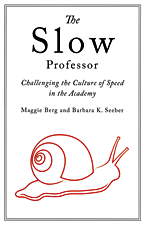
Maggie Berg & Barbara K. Seeber. Toronto, ON:
University of Toronto Press, 2016; 136 pp;
ISBN: 978-1-44264-556-1.
As corporate practices and the neoliberal ideology that sustains them increasingly and seemingly inexorably alter the organization and social function of colleges and universities, professional educators are witnessing and suffering profound changes in their working conditions.
New business models with ever greater reliance on contingent faculty are undermining collegiality. New expectations of entrepreneurship in pursuit of customers (formerly known as students) compel teachers not only to become involved in marketing, fundraising and “branding,” but also to accept new methods of faculty assessment and measures of accountability.
Even research, so desperately sought as public funding diminishes, is now held to standards of commercial utility, not scholarly excellence. So, the comic image of the rumpled, absent-minded professor is being replaced by the frantic reality of a pressurized workplace housing the third most stressful occupation in Canada.
In The Slow Professor, authors Maggie Berg and Barbara Seeber neither describe nor endorse procrastination and lethargy; instead, they offer a personalized account of life in the no longer idyllic, other-worldly and cloistered academy. They acknowledge that their impulse to write emerged from long sessions in which they had already been “unflaggingly playing therapist” for each other. They see the need and advocate for deliberative, imaginative and reflective thought as definitive of a professor’s work and life. Creativity and contemplation, they understand, can’t be multitasked.
After an engaging introduction wherein they set the problem of survival in the corporate environment, they address four main areas of angst: time management, pedagogy, research and collegiality, before closing with a consideration of collaboration bordering on solidarity as an essential element of employment in any institution of advanced learning worthy of the name.
Each chapter combines anecdotes and analyses drawn from mainly familiar writers who have studied the woes of contemporary post-secondary teaching and learning. Added to their complaints and lamentations, Berg and Seeber identify the predicaments and perpetual crises (post)modern academia and connect them to intimations of deprival, professional anxieties and explanations of the effects of the corporate culture on lives lived in the classroom as well as the loss of desperately needed time for reflection, course preparation, independent research and just living. Also salted and peppered throughout are references to critical pedagogues who have written extensively and astutely about what the authors have experienced.
The Slow Professor is unabashedly a “self-help” book, but not in the hideous style of big chain bookstore merchandise attending to the needs of semi-literate viewers of Dr. Phil. Instead, it is reminiscent of the era of consciousness-raising that grounded second-wave feminism a half-century ago. A dust-jacket endorsement advises that the book should be given to newly hired faculty and freshly minted PhDs seeking employment in the fast-paced, frenetic academic world today. It gently and good-humouredly reassures the novice and the veteran alike that their fears, their feelings of futility and their fretful excursions into sometimes damaging self-criticism are not entirely their fault.
The book is both aspirational and redemptive. It allows newcomers to imagine workable alternatives to a mendacious managerial ethos, and helps the nearly burned-out to “reclaim some of their sanity.” It makes us all realize that, if we strive to restore some time for deliberation and some space to renew the enjoyment of teaching, to reorient research toward understanding more than monetizing, and to embrace whatever remains of our community of scholars, then tonic change can be made possible. Faintly echoing Gloria Steinem’s mantra that “the personal is political,” Berg and Seeber leave the rest to us.
The Slow Professor recognizes the psychological strains of academic work, but subtly points toward explicitly political responses to the emotional toxins we absorb; but, it also avoids the fate of most subject-centred therapeutic exercises which are mainly courses in adaptation and resignation. Although it is no call to arms, no manifesto, nor a shout of defiance at the authorities, for insightful readers, the next step beyond self-awareness will be obvious.
________________________________________
Howard A. Doughty is a professor at Seneca College located in Toronto.